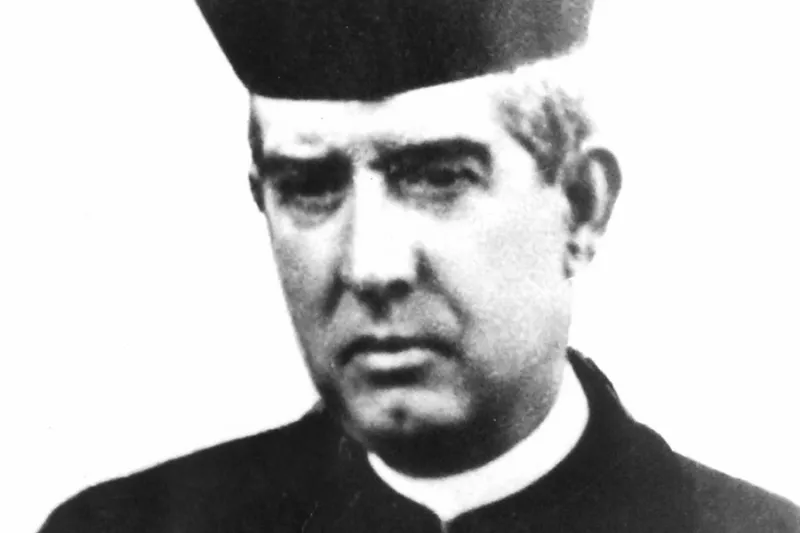
Granada, Spain, Dec 1, 2021 / 18:00 pm (CNA).
The beatification ceremony for sixteen martyrs of the Spanish Civil War will be held in February at the Granada Cathedral.
Fr. Cayetano Giménez Martín and his 15 companions will be beatified Feb. 26, 2022. Of the group, all were priests, except a seminarian and a layman.
The Spanish Civil War was fought from 1936 to 1939 between the Nationalist forces, led by Francisco Franco, and the Republican faction. During the war, Republicans martyred thousands of clerics, religious, and laity; of these, 11 have been canonized, and more than 2,000 beatified.
Fr. Cayetano refused to escape to safety at the outbreak of the Spanish Civil War. When his parish church was burned, he took refuge with a family for two weeks but was captured, and then shot Aug. 1, 1936, shouting “Viva Cristo Rey”.
His companions were: Fr. José Becerra Sánchez; Fr. José Jiménez Reyes; Fr. Pedro Ruiz de Valdivia; Fr. Francisco Morales Valenzuela; Fr. José Frías Ruiz; Fr. Manuel Vázquez Alfalla; Fr.Ramón Cervilla Luis; Fr. Lorenzo Palomino Villaescusa; Fr. José Rescalvo Ruiz; Fr. Manuel Vilches Montalvo; Fr. José María Polo Rejón; Fr. Juan Bazaga Palacios; Fr. Miguel Romero Rojas; Antonio Caba Pozo, a seminarian; and José Muñoz Calvo, a layman.
Caba Pozo was about 22 when he was arrested on July 19, 1936. He was shot while praying the rosary two days later.
Muñoz Calvo was president of the youth of Catholic Action. He was jailed July 27, 1936 for refusing to deny his membership in the group, and killed July 30.
The diocesan phase to study their cause for beatification was opened on July 1, 1999 and concluded on Sept. 28 the same year. On Nov. 29, 2019, the Holy See announced the promulgation of the decree of martyrdom.
While there is a tendency to associate the Spanish martyrs of the 20th century solely with the civil war of 1936-39, there were decades of preparation leading to this, accompanied by desecrations of churches, according to a Spanish priest serving in Rome.
The religious persecution in Spain in the 20th century took “some preparation. It is not something that can be narrowed down, it cannot be limited simply to the first months of the Spanish Civil War,” Msgr. José Jaime Brosel Gavilà, rector of Santa Maria in Monserrato degli Spagnoli, the Spanish national church in Rome, told ACI Prensa, CNA’s Spanish language news partner, last year.
While a great number of the martyrs lost their lives during the civil war, there were also other periods, such as the Tragic Week, an uprising of Republicans, socialists, and anarchists in Catalonia in July 1909; the proclamation of the Second Spanish Republic in 1931; and the Revolution of 1934, a movement of rebellious strikes.
These incidents were also accompanied by the destruction of religious buildings, desecrations, persecution, and the murder of priests, bishops, men and women religious, and lay people out of hatred of the faith.
If you value the news and views Catholic World Report provides, please consider donating to support our efforts. Your contribution will help us continue to make CWR available to all readers worldwide for free, without a subscription. Thank you for your generosity!
Click here for more information on donating to CWR. Click here to sign up for our newsletter.




American socialists, democracy ideologues supported Spain’s Republicans despite knowledge of the atrocities. Ernest Hemmingway became an apologist writing For Whom the Bell Tolls and reporting on the conflict. Generalissimo Franco of course was villified by the West, particularly due to his military and political support from Nazi Germany and Fascist Italy. Although he had little choice in fielding his Spanish Moroccan army in a civil war. His support of Germany during WWII was token since his ardent Catholicism, personal values weren’t consistent with Adolf’s.
Spain has had a torn history and today is tending once again toward secular socialism. Spain’s Catholic church would likely not exist as it is today if it were not for Franco. Unfortunately Catholicism in Spain is suffering the same secularist trend as most of the Church in the West. The blood of her martyrs we pray will redeem that trend and ignite a return to Apostolic witness to Christ.